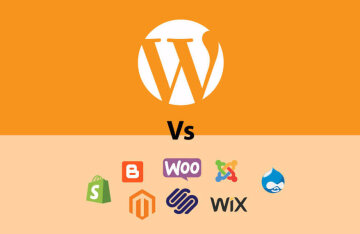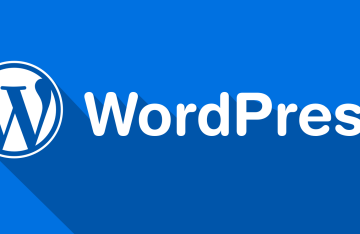Best 5 Most Popular CMS platforms in 2023

As of 2023, the most popular Content Management System (CMS) in the world is WordPress. According to W3Techs, as of March 2023, WordPress powers approximately 43.2% of all websites on the internet. Other popular CMS options include Shopify, Wix, Squarespace and Joomla. However, none of these have reached the level of usage and popularity that WordPress has achieved.
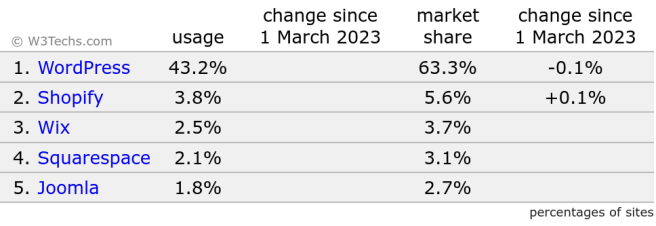
What is a CMS Platform?
A CMS platform, or content management system platform, is a software application that allows users to create, manage, and publish digital content, such as text, images, videos, and audio, on the web. It provides a user-friendly interface and a set of tools to help users create and organize content, and typically includes features for content authoring, editing, publishing, and distribution.
A CMS platform can be used to create a variety of websites, from simple blogs and personal websites to complex enterprise-level sites. These platforms typically offer a range of templates and themes to help users create a visually appealing website, as well as plugins and add-ons that add additional functionality to the website.
Overall, a CMS platform is a powerful tool that allows users to create and manage digital content on the web without the need for extensive technical knowledge or expertise. It can be used by individuals, businesses, and organizations to create and manage websites, blogs, online stores, and other digital content.
WordPress
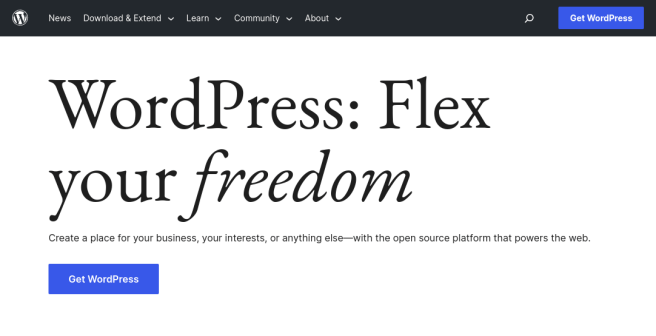
WordPress is a free and open-source content management system (CMS) that was first released in 2003. It is written in PHP and uses a MySQL database to store content. WordPress is used to build a wide range of websites, from simple blogs to complex e-commerce websites.
Here are some key features and characteristics of WordPress:
-
User-friendly: WordPress is easy to use, and you don't need to be a programmer or have any technical skills to create and manage a website.
-
Customizable: WordPress offers a wide range of themes and plugins that allow you to customize your website's look and functionality.
-
SEO-friendly: WordPress is designed to be search engine optimized, with features that make it easy to optimize your content for search engines.
-
Mobile-friendly: Most WordPress themes are mobile-responsive, meaning your website will look great on any device.
-
Security: WordPress is constantly updated to address security vulnerabilities and keep your website safe from hacking attempts.
-
Large community: WordPress has a large community of developers, designers, and users who contribute to its development and provide support to others.
While WordPress is a widely popular and powerful CMS platform, it does have some disadvantages that users should be aware of. Here are some potential drawbacks of using WordPress:
-
Security risks: As a popular CMS platform, WordPress can be a target for hackers and cyberattacks. While WordPress provides security measures and updates to address vulnerabilities, users need to be diligent in maintaining their website's security by using strong passwords, keeping plugins and themes updated, and implementing additional security measures.
-
Complexity: While WordPress is designed to be user-friendly, it can still have a steep learning curve for some users, especially those without technical expertise. Setting up a website can require knowledge of coding and web development, and customizing and managing a website can be time-consuming.
-
Plugin compatibility issues: While WordPress offers a vast range of plugins and themes that add functionality and design to a website, these plugins and themes may not always be compatible with each other, causing conflicts that can break the website or cause other issues.
-
Limited support: While WordPress offers a large and helpful community of users and developers who can provide support and advice, it does not offer formal customer support for its free version. Users may need to rely on online resources, forums, or paid support services to troubleshoot issues.
-
Dependency on third-party hosting: WordPress websites require web hosting services, which can add additional costs and dependency on the reliability and security of third-party hosting providers.
Overall, WordPress is a versatile and powerful CMS that can be used to create almost any type of website.
You can read more about advantages and disadvantages of WordPress here.
Shopify

Shopify is a popular e-commerce platform that allows businesses to create and manage their online stores. It was founded in 2004 and has since grown to become one of the most popular e-commerce solutions, powering over 1 million businesses in more than 175 countries.
Here are some key features and characteristics of Shopify:
-
Easy to use: Shopify is user-friendly and easy to set up, making it a popular choice for businesses that want to start selling online quickly.
-
E-commerce features: Shopify offers a range of e-commerce features, including payment processing, inventory management, shipping and tax calculations, and more.
-
Customizable: Shopify offers a wide range of templates and themes that allow businesses to customize the look and feel of their online store.
-
App integrations: Shopify has a large app store that offers a wide range of integrations and extensions, allowing businesses to add additional functionality to their online store.
-
Security: Shopify is a secure platform that uses SSL encryption to protect customer data and payment information.
-
Support: Shopify offers 24/7 customer support via phone, email, and live chat, as well as a large community of developers and users who can provide help and advice.
While Shopify is a popular and user-friendly e-commerce platform, it does have some potential disadvantages that users should consider. Here are some of the most common disadvantages of using Shopify:
-
Transaction fees: While Shopify offers a range of pricing plans, some of the lower-tier plans charge additional transaction fees for each sale made on the platform. This can add up over time and cut into the profits of small businesses.
-
Limited customization: While Shopify offers a range of themes and templates that allow users to customize their store's design, users may find that they have limited options for customizing the look and feel of their store beyond these templates. Advanced customization requires technical expertise or hiring a developer.
-
Limited ownership: While users own their store's content and data, the actual Shopify platform is owned and controlled by Shopify. This means that users may be limited in their ability to migrate their store to a different platform if they choose to do so.
-
App dependency: While Shopify offers a range of apps and integrations that add functionality to a store, users may find that they become dependent on these third-party apps and services to run their store effectively. This can add additional costs and complexity to running a store.
-
Limited blogging features: While Shopify offers basic blogging features, they may not be as robust or flexible as those offered by dedicated blogging platforms like WordPress.
Overall, Shopify is a powerful and flexible e-commerce platform that can help businesses of all sizes to sell online.
Wix

Wix is a cloud-based website builder that allows users to create professional-looking websites without any coding knowledge. It was founded in 2006 and has since grown to become one of the most popular website builders, with over 180 million users in 190 countries.
Here are some key features and characteristics of Wix:
-
Drag-and-drop editor: Wix's drag-and-drop editor allows users to easily create and customize their website's design and layout without any coding knowledge.
-
Customizable templates: Wix offers a wide range of customizable templates that users can use as a starting point for their website design.
-
App market: Wix has an app market that offers a wide range of apps and integrations that allow users to add additional functionality to their website.
-
E-commerce features: Wix offers a range of e-commerce features, including payment processing, inventory management, and shipping and tax calculations.
-
Mobile-friendly: Wix websites are mobile-responsive, meaning they will look great on any device.
-
Support: Wix offers 24/7 customer support via phone, email, and live chat, as well as a large community of developers and users who can provide help and advice.
While Wix is a popular and easy-to-use website builder, it does have some potential disadvantages that users should consider. Here are some of the most common disadvantages of using Wix:
-
Limited customization: While Wix offers a range of templates and design options, users may find that they have limited options for customizing the look and feel of their website beyond these templates. Advanced customization requires technical expertise or hiring a developer.
-
Dependency on Wix: Unlike self-hosted CMS platforms like WordPress, Wix is a closed platform that is owned and controlled by Wix. This means that users may be limited in their ability to migrate their website to a different platform if they choose to do so.
-
Limited SEO capabilities: While Wix offers some basic SEO tools, users may find that these tools are not as robust or flexible as those offered by dedicated SEO plugins for other platforms.
-
Limited functionality: While Wix offers a range of features and add-ons, some users may find that the platform is limited in its functionality compared to more advanced CMS platforms.
-
Slow loading times: Wix websites can be slower to load compared to other CMS platforms, which can negatively impact user experience and SEO.
Overall, Wix is a user-friendly and flexible website builder that can help users of all skill levels to create professional-looking websites.
Squarespace
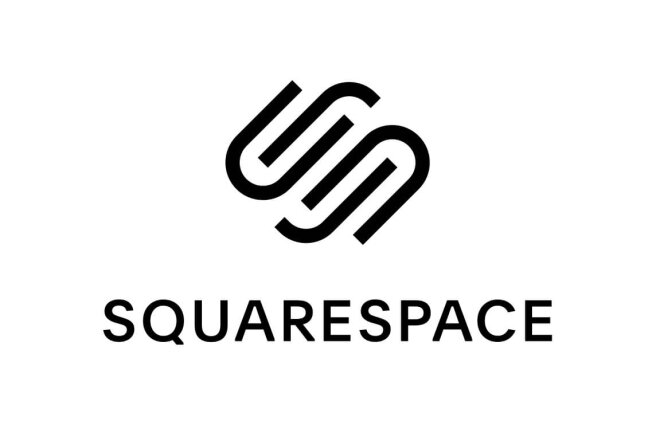
Squarespace is a website builder and hosting service that allows users to create and manage websites without any coding knowledge. It was founded in 2003 and has since grown to become one of the most popular website builders, with over 2 million users worldwide.
Here are some key features and characteristics of Squarespace:
-
Templates: Squarespace offers a range of professionally-designed templates that users can customize to create their website's design and layout.
-
Drag-and-drop editor: Squarespace's drag-and-drop editor allows users to easily add and edit content on their website without any coding knowledge.
-
E-commerce features: Squarespace offers a range of e-commerce features, including payment processing, inventory management, and shipping and tax calculations.
-
Mobile-responsive: Squarespace websites are mobile-responsive, meaning they will look great on any device.
-
Analytics: Squarespace offers website analytics that allow users to track their website's performance and user engagement.
-
Support: Squarespace offers 24/7 customer support via email and live chat, as well as a large community of developers and users who can provide help and advice.
While Squarespace is a popular and visually appealing website builder, it does have some potential disadvantages that users should consider. Here are some of the most common disadvantages of using Squarespace:
-
Limited customization: While Squarespace offers a range of templates and design options, users may find that they have limited options for customizing the look and feel of their website beyond these templates. Advanced customization requires technical expertise or hiring a developer.
-
Limited third-party integrations: Squarespace offers a range of built-in features, but users may find that they have limited options for integrating with third-party services and tools.
-
Limited SEO capabilities: While Squarespace offers some basic SEO tools, users may find that these tools are not as robust or flexible as those offered by dedicated SEO plugins for other platforms.
-
Limited e-commerce capabilities: While Squarespace offers some e-commerce functionality, users may find that it is limited compared to dedicated e-commerce platforms like Shopify.
-
Dependency on Squarespace: Squarespace is a closed platform that is owned and controlled by Squarespace. This means that users may be limited in their ability to migrate their website to a different platform if they choose to do so.
Overall, Squarespace is a powerful and flexible website builder that can help users of all skill levels to create professional-looking websites.
Joomla

Joomla is a free and open-source content management system (CMS) that allows users to create and manage websites. It was first released in 2005 and has since grown to become one of the most popular CMSs, with millions of users worldwide.
Here are some key features and characteristics of Joomla:
-
Customizable: Joomla offers a wide range of templates and extensions that allow users to customize their website's design and functionality.
-
User management: Joomla allows users to create and manage different user groups with different levels of access and permissions.
-
Multilingual support: Joomla supports multiple languages, making it a popular choice for websites that cater to an international audience.
-
E-commerce features: Joomla offers a range of e-commerce features, including payment processing, inventory management, and shipping and tax calculations.
-
SEO-friendly: Joomla is designed to be search engine optimized, with features that make it easy to optimize your content for search engines.
-
Support: Joomla has a large community of developers and users who contribute to its development and provide support to others.
While Joomla is a popular and flexible CMS platform, it does have some potential disadvantages that users should consider. Here are some of the most common disadvantages of using Joomla:
-
Complexity: Joomla can be more complex and difficult to use than other CMS platforms, particularly for beginners. Users may need to spend more time learning how to use the platform effectively.
-
Limited third-party support: While Joomla offers a range of extensions and plugins, users may find that there are fewer third-party developers and resources available compared to other platforms like WordPress.
-
Limited design flexibility: While Joomla offers some design templates and customization options, users may find that they have limited options for customizing the look and feel of their website beyond these templates.
-
Limited SEO capabilities: While Joomla offers some basic SEO tools, users may find that these tools are not as robust or flexible as those offered by dedicated SEO plugins for other platforms.
-
Limited e-commerce capabilities: While Joomla offers some e-commerce functionality, users may find that it is limited compared to dedicated e-commerce platforms like Shopify or Magento.
Overall, Joomla is a flexible and powerful CMS that can be used to create a wide range of websites, from simple blogs to complex e-commerce websites.

